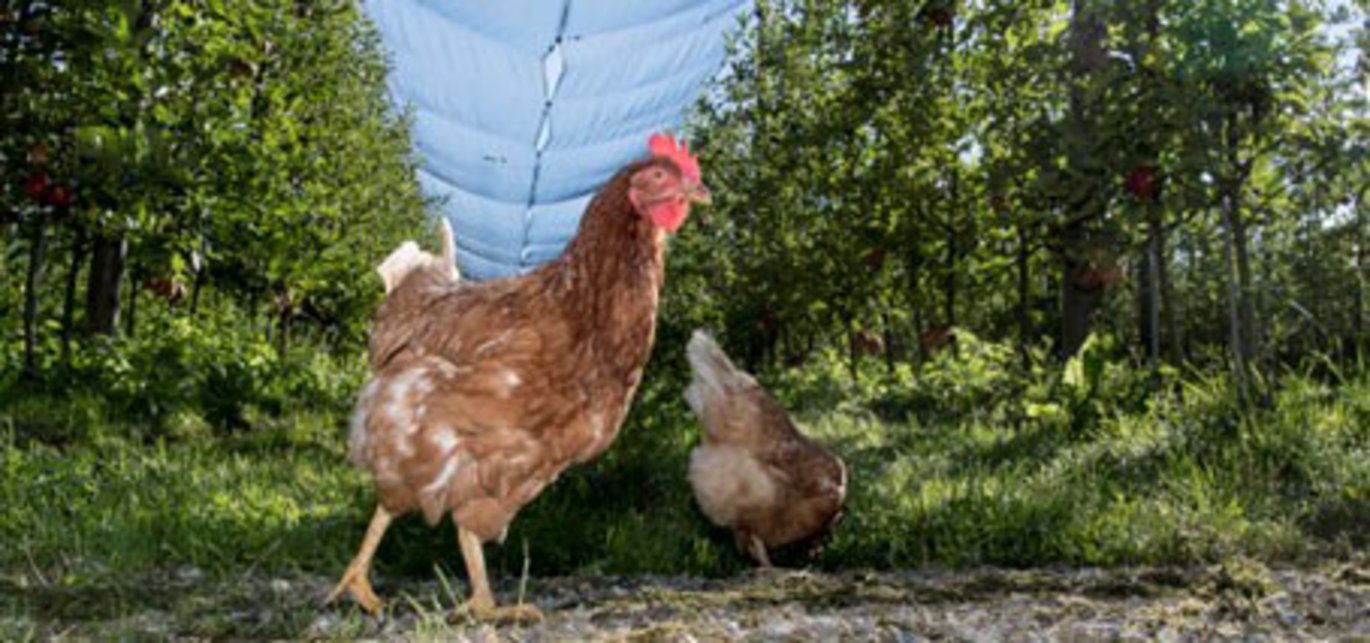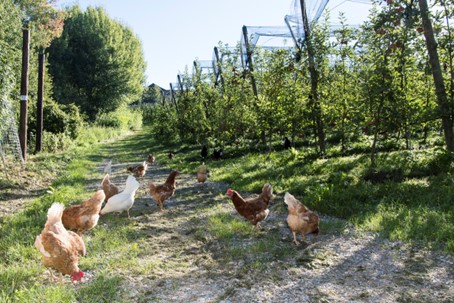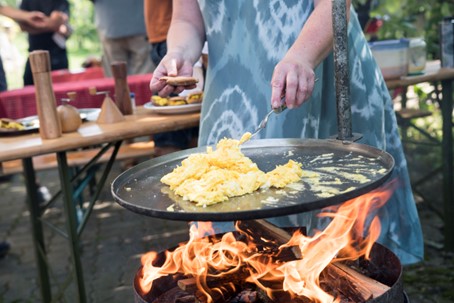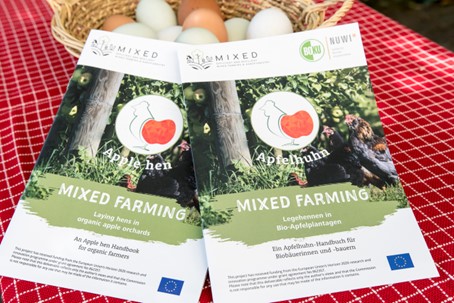The Apple Hen farmers face the challenges
A few years ago, in the Austrian province of Styria five pioneer organic fruit farmers came together with an unusual idea: Keeping spent laying hens for a second production cycle in organic orchards.




Spent hens are laying hens that come from an organic layer farm with good flock management after they have completed their laying period. The five Demeter bio-dynamic farmers became aware that their organic orchards were becoming increasingly professional, but that this specialisation was displacing the organic approach of mixed farming and circular farming. The keeping of so-called "Apple Hens" can therefore be seen as a great enrichment for the farmers. There is enough space with-, several hectares of orchards on each farm. The green areas underneath the fruit trees are not further used. In addition, organic spent hens are available locally at low cost.
In the beginning, the organic farmers jointly developed small mobile sheds that were placed directly in the organic orchards. In the meantime, several years have passed, so the first structural changes are pending. After been working with animals for several years, one often notices how a barn has to be in order to provide the best possible conditions for people, animals and the environment.
The MIXED project makes it possible to scientifically follow the expansion of this special type of combination of fruit production and animal husbandry over several years and support the pioneer farmers in the implementation. In addition, the networking of the different countries and the MIXED initiatives ensure that ideas can be expanded beyond national borders. Through numerous communication efforts, the use of the MIXED social media channel and the dissemination on the MIXED homepage, it is possible to reach a large number of interested stakeholders. Through constant contact with the pioneer farmers through workshops, field days and demo days, the "Apple Hen" idea is constantly strengthened and spread.
Fluctuating demand and supply
Nevertheless, both the MIXED organic fruit farmers and we as accompanying scientists face the challenge that the development of a promising concept has come to a standstill; the start of the Apple Hens was crowned with success, and the consumers were enthusiastic - according to them the eggs were characterised by exceptionally good taste and consistency - there were basically too few eggs available. With the Corona pandemic and its lockdowns, many people in Austria decided - similar to earlier times of subsistence farming - to only keep a few hens for their own use again.
Soon, the successful Apple Hen project came to a standstill; there were too many eggs for the farming families, but at the same time too few eggs for sale on a larger scale.
Co-creation of new initiatives
Through the MIXED project, there is a constant exchange between practice and science, and the University of Natural Resources and Life Sciences, Vienna (BOKU) constantly try to provide suggestions. Sitting together and discussing during a field workshop helps to avoid stagnation and to encourage further thinking. Examples of this positive interaction include the development of a larger, resource-saving model barn by one of the pioneer farmers, the production of an "Apple Hen" manual for other interested parties, and the testing of Apple Hen eggs for potential copper residues from the copper applications in the orchard.
Networking with other actors playi a key role. For instance, an organic farmer in Lower Austria had also started keeping Apple Hens at about the same time. In his region, despite of the Corona pandemic, the demand for the unusual eggs with the intense yellow yolk did not end, but has grown steadily, after having integrated the organic eggs into the already existing sales channels of his organic apples. In the meantime, his eggs are delivered to coffee houses in Vienna, or used regionally in gastronomy or for pastry production sold at farmers' markets. Eggs that do not meet external quality standards (e.g. too thin shell) are used for organic pasta by a neighbouring farmer.
Positive examples like this can strengthen the motivation of other organic farmers in difficult moments. At a MIXED field workshop on 26 July 2023 in Puch near Weiz in south-eastern Styria, a joint marketing initiative for organic Apple Hens, the challenges and consequences involved for the Styrian "Apple Hen project" were discussed jointly by MIXED pioneer farmers and the MIXED team of the University of Natural Resources and Life Sciences, Vienna: Increase in flock size, higher labour input, feed supply, marketing initiatives etc.
Sometimes the path only shows itself when you start walking it (Paulo Coelho) - our organic Apple Hen farmers are now walking a new path. We are looking forward to accompanying them for another year on their exciting journey and to master the upcoming challenges together through the MIXED project.
#BOKU #H2020Mixed in Austria!
